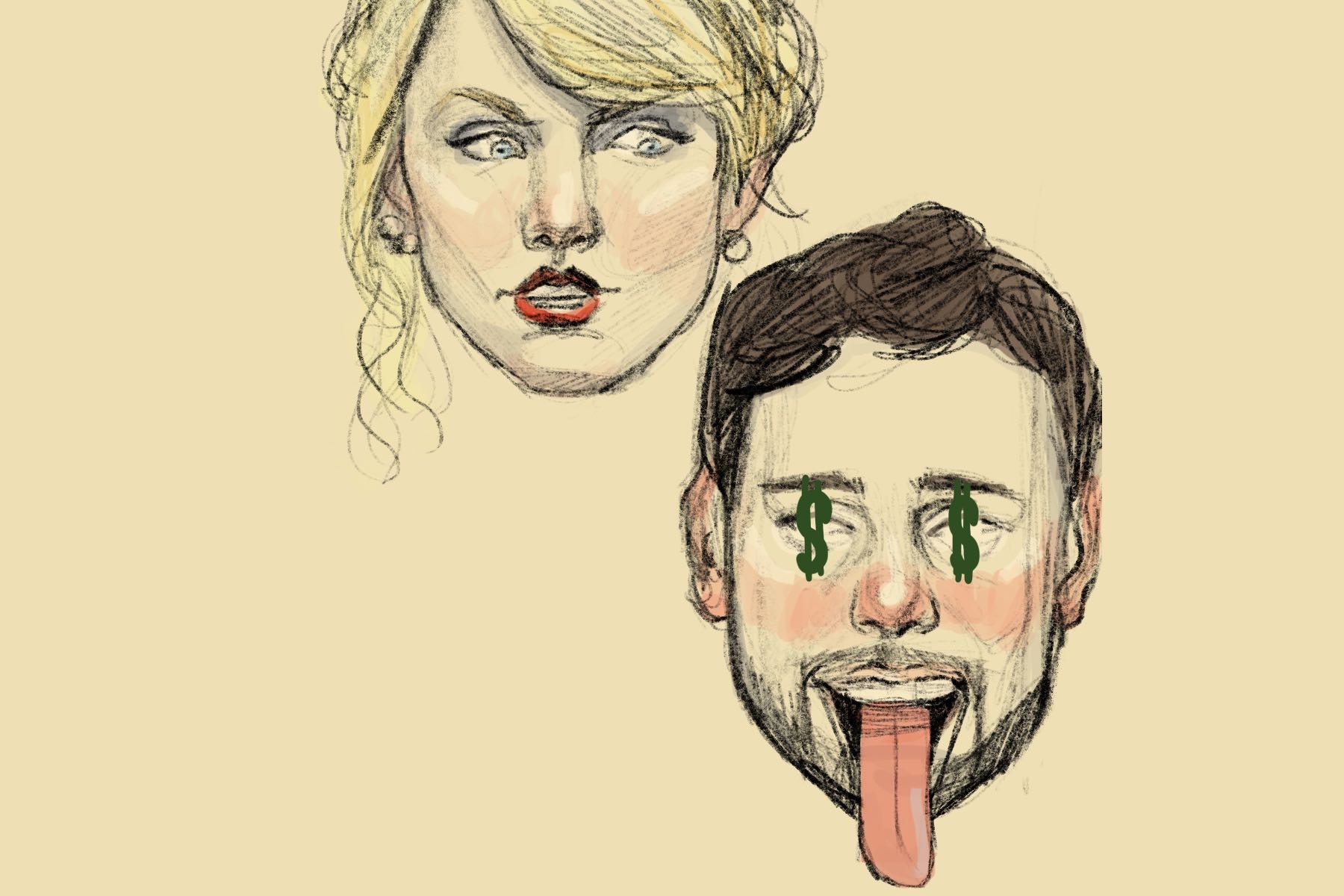You’ve probably heard this story: a naïve singer’s hand hovers over a complicated, number-ridden contract; supposedly, a simple signature is all that lies between the budding musician and stardom. The document is confusing, but the music mogul seems trustworthy enough, and with a swipe of the pen, the artist signs away their wealth and creative liberty. Recently, Taylor Swift has claimed that she is the latest victim of this infamous scenario.
The music industry is overflowing with similar stories, and even music icons like Elvis Presley, Johnny Cash and Prince suffered the sting of a hastily-signed contract. Swift reintroduced the well-known drama into public attention, calling out Scott Borchetta and Scooter Braun for supposedly shady business practices.
Is the comparison accurate? Does the Taylor Swift versus Scooter Braun feud actually resemble the classic underdog story? In order to understand the situation, onlookers must first navigate years of controversy and economic disputes, but in the end, the general chaos seems to boil down to one question: Who should control an artist’s career?
On June 30, 2019, Swift uploaded a lengthy Tumblr post in response to the monumental news that Scooter Braun, owner of Ithaca Holdings, acquired Swift’s previous label, Big Machine Records. According to the post, Swift had “pleaded for a chance to own” the six albums that the label possessed, and the company’s counteroffer proposed that Swift rejoin the label, where she would receive the rights to one old album for each new one she created for them.
Multiple sources, including a screenshot shared by Big Machine Record’s owner Scott Borchetta, confirm these negotiation terms.
Initially, Swift considered striking a deal with her former label; Borchetta’s screenshot reveals that she proposed a seven-year agreement, which the company quickly bumped to ten. At first, the lengthy negotiations did not turn Swift away from the idea; rather, as she revealed in a tweet, Swift knew that “once I signed that contract, Scott Borchetta would sell the label, thereby selling me and my future.”
In Swift’s mind, she was pursuing a useless agreement, and, ultimately, she made the “excruciating choice” to leave her life’s work in Borchetta’s hands, making “peace with the fact that eventually he would sell them.”
However, when Borchetta sold Big Machine Records to Scooter Braun, Taylor Swift changed her tune. “This is my worst case scenario,” she wrote in the post, and it is not hard to understand why. In the past, Braun worked closely with Kanye West, whose well-known feud with the pop star has attracted no end of public attention. While Braun was his manager, West released his music video for “Famous,” which Swift famously denounced.
Additionally, Swift claims Braun “got his two clients together to bully me online,” and she included a photo of West, Braun and Justin Bieber peering into the camera, with what appear to be derisive smiles. Obviously, there’s plenty of bad blood between these celebrities.
The conversations surrounding the Swift-Braun feud have predominantly centered around celebrity allegiances. Team Braun includes noteworthy celebs like Justin Bieber, Demi Lovato and Sia, each of whom have shared their support for the mogul online. In their respective statements, each musician adamantly defends Braun’s character, describing their personal and professional interactions with the manager.
https://www.instagram.com/p/BzWfMAWAIkE/
On the other side, stars like Brendon Urie, Halsey, Cara Delevingne, Iggy Azalea and Kelly Clarkson continue to rally around Swift. However, the pro-Swift individuals typically skip the personality defenses and target the source of the issue.
At its core, the Swift-Braun issue is about more than superficial celebrity alliances, and if you disregard the controversy as another classic Swift feud, you will miss its thought-provoking undercurrent of ideas. Swift’s post prompted the well-worn question about how much power artists should maintain over their creations. Obviously, managers should have some control, since they handle contracts, events and publicity.
🦋 @taylorswift13 pic.twitter.com/1iI2tCr8my
— h (@halsey) June 30, 2019
However, the typical manager-star agreement results in an uneven distribution of power; since Swift signed with Big Machine Records at 15, the label owns her master recordings “for the life of the author plus an additional 70 years.” The contract essentially shackles Swift to the label forever, with very few legally permissible ways to escape. Conceivably, Big Machine Records could transfer from owner to owner, and any star must continue to follow the label as it changes hands.
When Kesha requested for removal from her contract with Dr. Luke, whom she famously accused of sexual assault, she wrote, “You can get a divorce from an abusive spouse. You can dissolve a partnership if the relationship becomes irreconcilable. The same opportunity — to be liberated from the physical, emotional, and financial bondage of a destructive relationship — should be available to a recording artist.”
If one party’s personal integrity dissolves, how should a contract-bound individual behave? Most of the time, artists must allow their enemies to profit from their own creativity because, after all, they relinquished control a long time ago.
In her post, Swift does not detail any future attempts to regain control, but she remains optimistic, and toward the end, she muses, “… hopefully, young artists or kids with musical dreams will read this and learn about how to better protect themselves in a negotiation. You deserve to own the art you make.”
The contract Swift signed as a young musician wasn’t ideal, but it represents a long tradition of relinquishing artistic authority. But now, she’s far from the naïve artist of classic Hollywood stories, and the narrative of perpetual victimization simply isn’t believable anymore.
In her newest record deal with Universal Music Group and Republic Records, Swift brokered a revolutionary agreement; as part of her new contract, “UMG must promise to hand over to artists, on a non-recoupable basis, a portion of the windfall from its Spotify shares in the future. Not just to Swift, but to all its artists.” Using her enormous influence, Taylor Swift is funneling wealth to other musicians, and this extraordinary deal could signify an upcoming positive change in the music industry. If nothing else, her latest estimated net worth indicates that she’s going to be just fine.
















